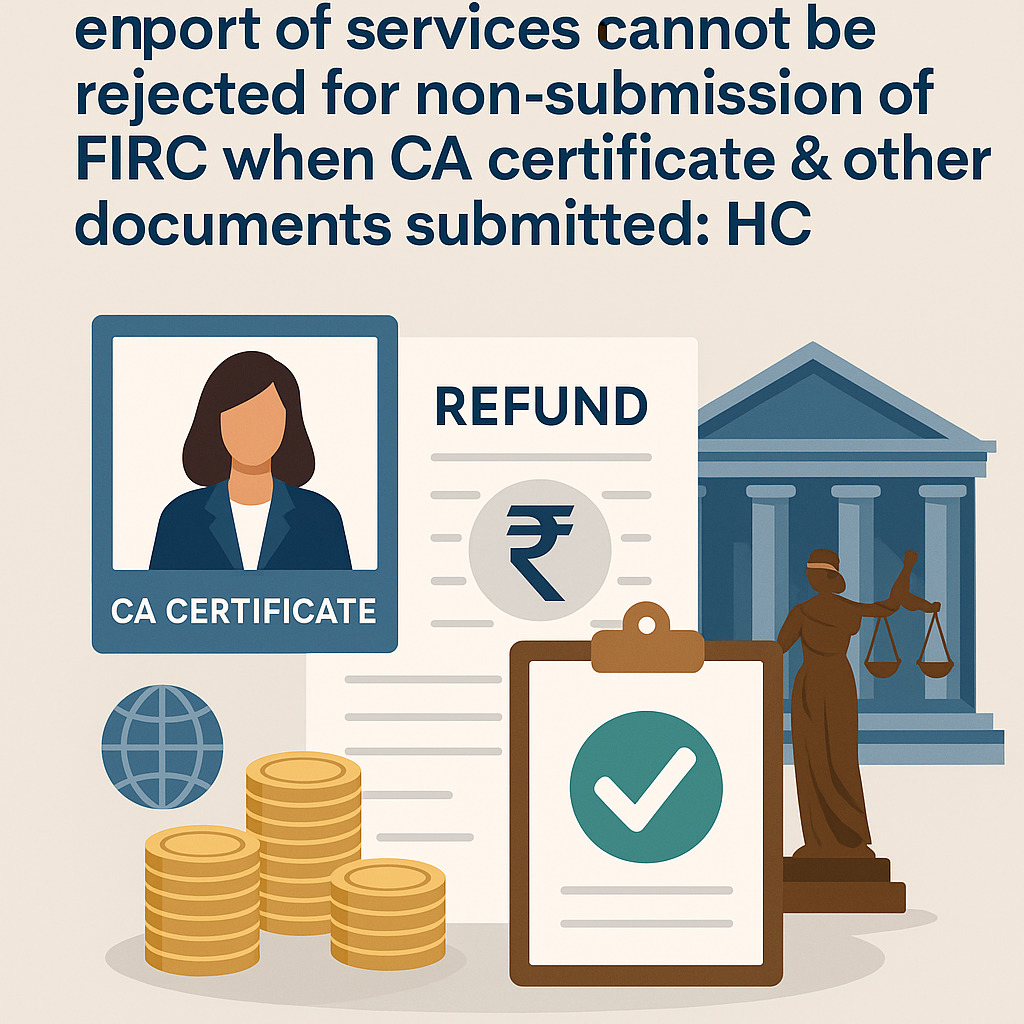View News
Refund-of-Unutilized-ITC-on-Export-of-Services

Refund of Unutilized ITC on Export of Services Cannot Be Denied for Non-Submission of FIRC: Gujarat High Court
High Court Clarifies Scope of Documentary Evidence for GST Refunds on Export Services
1. Introduction
In a landmark judgment that addresses a recurrent issue under the GST regime, the Hon’ble Gujarat High Court ruled that the refund of unutilized Input Tax Credit (ITC) on export of services cannot be denied solely on the ground of non-submission of Foreign Inward Remittance Certificate (FIRC), if other credible evidence, including a Chartered Accountant's certificate, establishes receipt of foreign exchange.
This decision significantly impacts exporters of services, especially IT/ITES, logistics, and consulting companies, by reaffirming a liberal and purposive interpretation of refund provisions under the CGST and IGST Acts.
2. Legal Background
Relevant Provisions:
Section 54 of the CGST Act, 2017 – Governs refund of tax, including unutilized ITC.
Rule 89 of the CGST Rules, 2017 – Lays down procedure and documentation for refund application.
Section 2(6) of the IGST Act, 2017 – Defines “export of services”, requiring:
-
Supplier of service located in India
-
Recipient outside India
-
Place of supply outside India
-
Payment received in convertible foreign exchange
-
Parties not merely establishments of the same person
3. Facts of the Case
-
The petitioner, Kuehne Plus Nagel Pvt. Ltd., is engaged in export of logistics support services to clients located outside India.
-
The petitioner claimed refund of unutilized ITC under Section 54 r/w Rule 89 on the basis that services were exported without payment of tax.
-
While the petitioner submitted CA-certified statements, bank realization certificates, and shipping documentation, it could not submit FIRCs in a few instances.
-
The refund was rejected by the GST Department on the sole ground of non-submission of FIRCs, despite no dispute regarding export nature or realization in foreign exchange.
4. Issue Before the Court
Can the refund claim of unutilized ITC on export of services be rejected merely for non-submission of FIRC, when other reliable documentary evidence, including a Chartered Accountant's certificate, has been submitted?
5. High Court's Observations
The Hon’ble Gujarat High Court made the following key observations:
Documentary Flexibility
-
Rule 89(2)(c) of the CGST Rules requires “evidence regarding receipt of foreign exchange” but does not mandate FIRC as the only form of such evidence.
-
The Chartered Accountant’s certificate certified that foreign currency had been realized and credited, satisfying the requirement under Section 2(6) of the IGST Act.
Purposeful Interpretation
-
The intent of the law is to ensure that the export of services results in inflow of convertible foreign exchange, not to burden exporters with unnecessary procedural rigidity.
-
The Court relied on the doctrine of substantial compliance, especially when alternative documents serve the same evidentiary purpose.
No Revenue Prejudice
-
The GST authorities did not dispute the actual export or realization of foreign exchange.
-
The refund denial was a hyper-technical approach, contrary to the principles of ease of doing business and fair tax administration.
6. Judgment
The High Court held:
“Refund claim of unutilized ITC on export of services cannot be rejected merely on the ground of non-submission of FIRC when a Chartered Accountant’s certificate certifying receipt of net foreign exchange and other supporting documents are submitted.”
Accordingly, the rejection order was quashed, and the Department was directed to process and grant the refund within the stipulated time.
7. Legal Significance
This judgment sets a progressive precedent and offers critical guidance for taxpayers and GST officers alike. Key takeaways include:
| Legal Principle | Application in This Case |
|---|---|
| Rule 89(2)(c) does not limit evidence to FIRCs | CA certificate + bank documents sufficient |
| Substantial compliance prevails over procedural lapse | Law should not be applied rigidly to deny substantive benefit |
| Exporters of services deserve ease in refund process | Encourages India’s export sector and preserves liquidity |
8. Practical Implications
-
Exporters facing delays in FIRC issuance from banks can rely on CA-certified documentation.
-
Departments must adopt a holistic view when assessing refund claims and cannot insist on one-size-fits-all documentation.
-
Professional advisors should ensure that CA certificates explicitly reference the foreign inward remittances and are corroborated by bank entries.
9. Conclusion
The Gujarat High Court's ruling in Kuehne Plus Nagel Pvt. Ltd. provides relief to the exporter community and fortifies the GST regime with judicial balance between procedural compliance and substantive justice. As GST law continues to evolve, this judgment reinforces that technical shortcomings should not override genuine entitlements, especially when the core objectives of tax laws are satisfied.
10. Citation & References
-
Kuehne Plus Nagel Pvt. Ltd. v. Union of India – Gujarat High Court, Order dated 26-03-2025
-
Section 54 of the CGST Act, 2017
-
Rule 89 of the CGST Rules, 2017
-
Section 2(6) of the IGST Act, 2017
-
Related cases:
-
Amit Cotton Industries v. Principal Commissioner of Customs (Gujarat HC)
-
KPMG v. UOI (Delhi HC, 2023)
-
"Unlock the Potential of Legal Expertise with LegalMantra.net - Your Trusted Legal Consultancy Partner”
Disclaimer: Every effort has been made to avoid errors or omissions in this material in spite of this, errors may creep in. Any mistake, error or discrepancy noted may be brought to our notice which shall be taken care of in the next edition In no event the author shall be liable for any direct indirect, special or incidental damage resulting from or arising out of or in connection with the use of this information Many sources have been considered including Newspapers, Journals, Bare Acts, Case Materials , Charted Secretary, Research Papers etc

